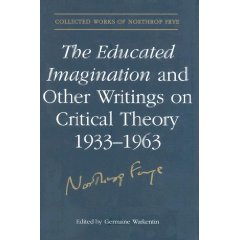Joe’s post on abduction as hunch reminds me of how often Frye uses the word “hunch.” It doesn’t appear in Fearful Symmetry or Anatomy of Criticism, but in The Educated Imagination there are two apposite passages:
Imagination is certainly essential to science, applied or pure. Without a constructive power in the mind to make models of experience, get hunches and follow them out, play freely around with hypotheses, and so forth, no scientist could get anywhere. But all imaginative effort in practical fields has to meet the test of practicability, otherwise it’s discarded. The imagination in literature has no such test to meet. You don’t relate it directly to life or reality: you relate works of literature, as we’ve said earlier, to each other. Whatever value there is in studying literature, cultural or practical, comes from the total body of our reading, the castle of words we’ve built, and keep adding new wings to all the time. (CW 21, 470)
You can’t distinguish the arts from the sciences by the mental processes the people in them use: they both operate on a mixture of hunch and common sense. A highly developed science and a highly developed art are very close together, psychologically and otherwise. (CW 21, 442)
In his notebooks Frye repeatedly writes about his hunches: I count 158 instances of the word strung out over the eight volumes.

